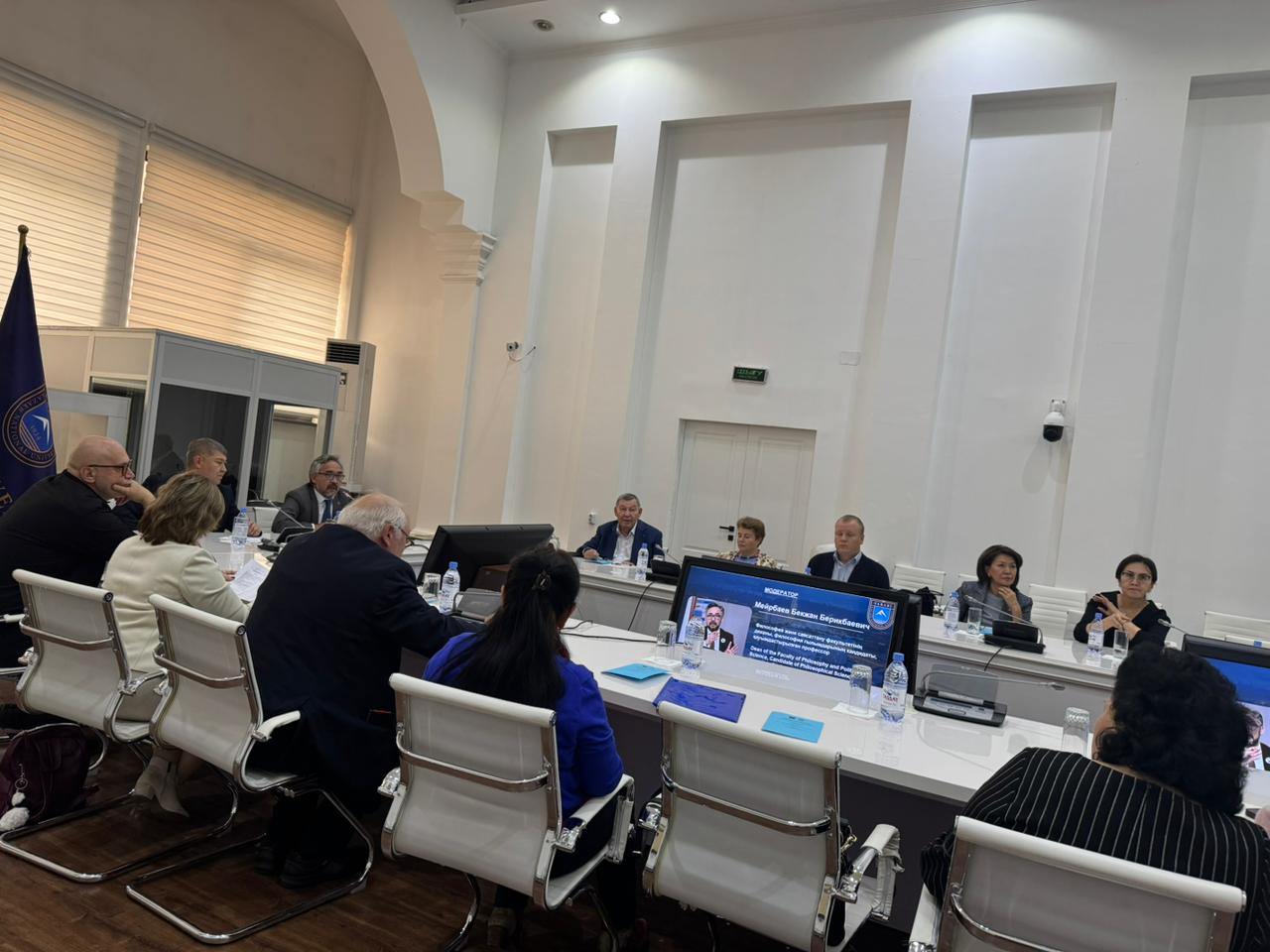- Main
- News
- The Digital Society as a Space of Transformations: Insights from the International Round Table at Al-Farabi Kazakh National University
The Digital Society as a Space of Transformations: Insights from the International Round Table at Al-Farabi Kazakh National University

On October 21, the Faculty of Philosophy and Political Science at Al-Farabi Kazakh National University hosted an international round table titled “The Digital Society as a Space of Social and Psychological Transformation: An Interdisciplinary Analysis.”
The event brought together leading scholars, researchers, and practitioners from Kazakhstan, Germany, and Russia to discuss the impact of digitalization on individuals, society, and modern social institutions.
The session was moderated by Bekzhan Meirbayev, PhD in Philosophy, Associate Professor, and Dean of the Faculty of Philosophy and Political Science. In his opening remarks, he emphasized that the digital age requires a new interdisciplinary language that unites philosophy, sociology, and psychology in analyzing the transformations of human experience and social practices. According to him, modern research should shape a holistic vision of the human being as a subject of digital reality.
Co-moderators of the event were Dr. Arman Nurmakhanbetov, Head of the Department of General and Applied Psychology at KazNU, and Dr. Gulmira Abdiraiymova, Head of the Department of Sociology and Social Work at KazNU.
Professor Konrad Reschke (Leipzig University, Germany) delivered a presentation on “Stress Management in the Digital Environment of Modern Society.” He noted that constant presence in the digital space is forming a “new type of subject” — a person living in a state of permanent connectivity and cognitive overload. The scholar highlighted the importance of digital hygiene, psychological self-regulation, and the need for interdisciplinary programs to prevent digital burnout.
Professor Alena Garber (Bad Wildungen / Mönchengladbach, Germany) presented a report on the consequences of excessive smartphone use for students’ mental and physical health. She pointed out that gadget addiction is directly linked to sleep disorders, anxiety, and reduced attention span. In her view, digital socialization requires new approaches to pedagogical and psychological support for youth.
The plenary session concluded with a conceptual presentation by Dr. Andrey Milekhin, Doctor of Sociology, Academician of the Russian Academy of Natural Sciences, and President of the ROMIR Research Holding, titled “Humanometry: The Measure of Participation.” His thesis that “a person’s participation in digital communication becomes a measure of their presence in society” sparked active discussion among sociologists and psychologists. Milekhin emphasized that digital behavior today is not merely a consequence of technology but a new form of social identity, where activity, engagement, and visibility define one’s status in the network.
The second part of the meeting featured a lively interdisciplinary discussion with the participation of Academician of the National Academy of Sciences of Kazakhstan Zarema Shaukenova, Professor Sveta Berdibayeva, Professor Leonid Gurevich, Director of BISAM Central Asia Andrey Skuratov, and leading sociologists and psychologists of KazNU. Participants discussed the influence of digitalization on social ties, trust, digital inequality, and the psychological consequences of living in a constant online environment.
Professor Gulmira Abdiraiymova noted that digitalization is shaping a new social reality where the boundaries between online and offline worlds are gradually fading, and social connections are taking on a hybrid nature. According to her, digitalization redefines the nature of social solidarity and challenges science to rethink the concepts of community and social capital.
Dr. Arman Nurmakhanbetov emphasized that mass digitalization leads to emotional overload and digital stress, making it essential to develop psychological culture, self-regulation skills, and critical thinking in information perception.
During the discussion, participants concluded that modern society is transitioning from a knowledge society to a data society, where information becomes the main resource and digital competencies a new form of social stratification. They stressed that the mission of science is not only to describe this process but also to shape the ethical and educational guidelines of a digital culture in which technology serves humanity.
The international round table became an important platform for exchanging ideas about the future of humanity in the digital world. The participants agreed that digitalization is not merely a technological but also an anthropological and sociocultural process, requiring the joint efforts of philosophers, sociologists, psychologists, educators, and IT specialists. As the experts noted, the human being must remain at the center of the digital society, and the humanities should serve as its moral compass.



